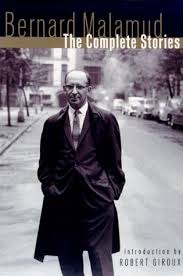Words of the Week: Bernard Malamud
 “I’m an American, I’m a Jew, and I write for all men. A novelist has to, or he’s built himself a cage. I write about Jews, when I write about Jews, because they set my imagination going. I know something about their history, the quality of their experience and belief, and of their literature, though not as much as I would like. Like many writers I’m influenced especially by the Bible, both Testaments. I respond in particular to the East European immigrants of my father’s and mother’s generation; many of them were Jews of the Pale as described by the classic Yiddish writers. And of course I’ve been deeply moved by the Jews of the concentration camps, and the refugees wandering from nowhere to nowhere. I’m concerned about Israel. Nevertheless, Jews like rabbis Kahane and Korff set my teeth on edge. Sometimes I make characters Jewish because I think I will understand them better as people, not because I am out to prove anything. That’s a qualification. Still another is that I know that, as a writer, I’ve been influenced by Hawthorne, James, Mark Twain, Hemingway, more than I have been by Sholem Aleichem and I. L. Peretz, whom I read with pleasure. Of course I admire and have been moved by other writers, Dostoyevsky and Chekhov, for instance, but the point I’m making is that I was born in America and respond, in American life, to more than Jewish experience. I wrote for those who read.”
“I’m an American, I’m a Jew, and I write for all men. A novelist has to, or he’s built himself a cage. I write about Jews, when I write about Jews, because they set my imagination going. I know something about their history, the quality of their experience and belief, and of their literature, though not as much as I would like. Like many writers I’m influenced especially by the Bible, both Testaments. I respond in particular to the East European immigrants of my father’s and mother’s generation; many of them were Jews of the Pale as described by the classic Yiddish writers. And of course I’ve been deeply moved by the Jews of the concentration camps, and the refugees wandering from nowhere to nowhere. I’m concerned about Israel. Nevertheless, Jews like rabbis Kahane and Korff set my teeth on edge. Sometimes I make characters Jewish because I think I will understand them better as people, not because I am out to prove anything. That’s a qualification. Still another is that I know that, as a writer, I’ve been influenced by Hawthorne, James, Mark Twain, Hemingway, more than I have been by Sholem Aleichem and I. L. Peretz, whom I read with pleasure. Of course I admire and have been moved by other writers, Dostoyevsky and Chekhov, for instance, but the point I’m making is that I was born in America and respond, in American life, to more than Jewish experience. I wrote for those who read.”
Source: Bernard Malamud’s 1974 “Art of Fiction” interview in The Paris Review. (Thanks to Kyle Minor for bringing this to my attention on Twitter this past weekend, which marked the 100th anniversary of Malamud’s birth.)
Thank you Erika. Malamud is to me one of the great but now sadly fading voices of twentieth century American writing. I first read him as a postgraduate student at Edinburgh University. At the time I was very much a “Bellow fellow” (as some unknown wit had scrawled on the wall of a toilet cubicle in the library). Reading The Assistant opened me to another voice. And what a voice! To me he seemed (and still seems) the most lyrical American prose writer since Scott Fitzgerald. I don’t unreservedly admire everything he wrote. I’m still not entirely convinced by The Fixer and I didn’t think God’s Grace was very good. But The Natural, The Assistant, A New Life, The Tenants and Dubin’s Lives (is there a better novel about a writer’s life?) are very, very important novels. They are also novels that give the reader (this reader at least) immense pleasure.
This is a link to a piece by Philip Roth that appeared in The London Review of Books in 1986.
http://www.lrb.co.uk/v08/n08/philip-roth/pictures-of-malamud
And then there is this: http://www.commentarymagazine.com/article/why-malamud-faded/
Thank you so much, Clive. I am realizing how woefully under-read I am when it comes to Malamud, and your post helps direct my reading!